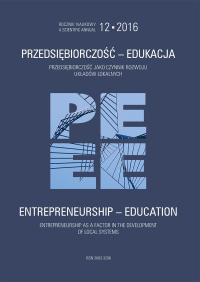Educational Role of Culinary Trails
DOI:
https://doi.org/10.24917/20833296.12.21Keywords:
culinary tourism, education, tourism, trailAbstract
The aim of the elaboration is to show the role in the educational process of tourists that the culinary trails play, both the ones existing naturally in the anthropogenic space, and the ones set by the tourism organizers. The culinary trails give the tourists the possibility to directly associate with the knowledge on the selected culinary products. They also create the conditions to actively participate and acquire the skills of using different tools, as well as shape the social competences through the personal contact with individual persons and societies creating food. The elaboration pays special attention to the role of direct cognition and observation, and participation in the events taking place on the culinary trail. It points out the connection between the education with tourism and brings out the place of the culinary trails in the education tourism. It also includes an analysis of which elements of the trails influence the recipients in different age groups education-wise and how. The creation and coordination of the culinary trails is a sign of their organizers’ entrepreneurship.References
Boniface, P. (2003). Tasting Tourism: Travelling for food and drink. Priscille Boniface, Ashgeste Publishing Limited, Hampshire.
Dominik, P. (2014). Szlak kulinarny jako produkt turystyczny. W: P. Dominik, (red.) Szlaki kulinarne jako element turystycznej atrakcyjności regionu Mazowsze. Warszawa: Oficyna Wydawnicza ASPRA-JR, 11–13.
Doroszewski, W. (1996). Słownik języka polskiego, Warszawa: PWN.
Drążkiewicz, J. (2015, 15 czerwca). Edukacyjne funkcje turystyki. Pozyskano z www.wycieczkiznami.pl.
Erasmus, E. (2006). Strategie uczenia się i studiowania w gospodarce rynkowej. ZN Almamer, Wyższa Szkoła Ekonomiczna, 3(43), 166.
Komeński, J.,A. (1956). Wielka dydaktyka, Wrocław: Ossolineum.
Kowalczyk, A. (2005). Turystyka kulinarna – ujęcie geograficzne, UW, Turyzm 15, 163–168.
Kruczek, Z. (2011). Szlak oscypkowy w Małopolsce. Droga od pomysłu do produktu turystycznego.
W: B. Włodarczyk, B. Krakowiak, J. Latosińska (red.), Kultura i turystyka. Wspólna droga, Łódź: Uniwersytet Łódzki, Instytut Geografii Miast i Turyzmu.
Kruczek, Z. (2013). Znaczenie szlaków kulturowych dla rozwoju turystyki edukacyjnej. W: A. Rapacz, Gospodarka turystyczna w regionie. Wrocław: Prace naukowe UE we Wrocławiu, 304, 124–126.
Lubański, K. (2006). Pedagogiczny potencjał turystyki. ZN Almamer Wyższa Szkoła Ekonomiczna, 3(43).
Milewska, M., Prączko, A., Stasiak, A. (2010). Podstawy gastronomii. Warszawa: PWE.
Przecławski, K. (1996). Człowiek a turystyka. Zarys socjologii turystyki. Kraków: Albis.
Przecławski, K. (1997). Turystyka a kultura na przełomie XX/XI wieku. Kulturowe aspekty turystyki i gospodarki turystycznej. Warszawa: PST, 13.
Puczko, L., Ratz, T. (2006). Trailing Goethe, Humbert, and Ulysses. Cultural Routes in Tourism. W: A. Stasiak, Produkt turystyczny – szlak, Turystyka i Hotelarstwo, 10, 9–40.
Rapacz, A. (2013). Gospodarka turystyczna w regionie. Prace naukowe UE we Wrocławiu, 304, 124.
Richards, G. (red.) (2007). Cultural tourism. Global and Local perspectives. New York: The Haworth Hospitality, Press, 131–148.
Rohrscheidt, A.M. (2010). Regionalne szlaki tematyczne. Idea, potencjał, organizacja. Krakow: Proksenia.
Turos, L. (2003). Turystyka edukacyjna i transgresja, Warszawa: Ypsilon.
Turos, L. (2001). Wprowadzenie do wiedzy o turystyce edukacyjnej, Warszawa: Ypsilon.
Woźniczko, M., Orłowski, D. (2009). Szlak Oscypkowy jako nowy produkt turystyczny Podhala. W: M. Jalinik (red.), Konkurencyjność produktow turystycznych. Białystok: Oficyna Wydawnicza Politechniki Białostockiej, 100–112.
Woźniczko, M., Orłowski, D. (2011a). Szlaki kulinarne komponentem wiejskiego produktu turystycznego. W: C. Jastrzębski (red.), Turystyka wiejska na drodze do komercjalizacji. Kielce: Wyd. Wyższa Szkoła Ekonomii i Prawa im. prof. Edwarda Lipieńskiego w Kielcach, 101–123.
Woźniczko, M., Orłowski, D. (2011b). Lubuski Szlak Wina i Miodu oraz jego kulturowe znaczenie dla rozwoju turystyki winiarskiej. W: B. Sawicki, J. Janicka (red.), Wielowymiarowe aspekty turystyki kulturowej. Lublin: Wyd. Uniwersytet Przyrodniczy w Lublinie, 158–174.
Woźniczko, M., Orłowski, D. (2014). Funkcjonowanie szlaków kulinarnych na Mazowszu. W: P. Dominik (red.), Szlaki kulinarne jako element turystycznej atrakcyjności regionu Mazowsze. Warszawa: Oficyna Wydawnicza ASPRA-JR, 133.
Wysokińska, B. (2014). Elementy historyczne w tworzeniu i rozwoju szlaków kulinarnych Mazowsza. Funkcjonowanie szlaków kulinarnych na Mazowszu. W: P. Dominik (red.), Szlaki kulinarne jako element turystycznej atrakcyjności regionu Mazowsze. Warszawa: Oficyna Wydawnicza ASPRA-JR, 51.
Zadrożna, D. (2014). Konsorcjum Produktowe „Szlaki Kulinarne” w ramach inicjowania, tworzenia i zarządzania partnerskimi grupami produktowymi. W: P. Dominik (red.), Szlaki kulinarne jako element turystycznej atrakcyjności regionu Mazowsze. Warszawa: Oficyna Wydawnicza ASPRA-JR, 207.
Downloads
Published
How to Cite
Issue
Section
License
Articles are published under the terms of the Creative Commons License (CC BY-ND 4.0; Attribution– NoDerivs).

